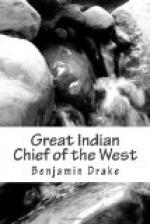remained the property of the United States, a few
quarter sections were sold, on Rock river, including
the Sac village. New insults and outrages were
now offered to the Indians, and they were again ordered
to remove, not from the quarter sections which had
actually been sold, but to the west side of the Mississippi.
Against this, they remonstrated and finally refused,
positively, to be driven away. The results of
this refusal have already been shown in the narration
which has been made of the events following upon the
“actual invasion” of the state of Illinois,
in the spring of 1831. But it has been said that
these Indians endeavored to form an alliance with
some of the neighboring tribes to defend their lands.
There is no doubt that Black Hawk labored to persuade
Keokuk and the Sac Indians residing with him, to return
to the east side of the Mississippi and assist in
defending their village. His effort to unite
with him, in alliance against the United States, the
Winnebagoes, Pottawatamies and Kickapoos, was probably
for the same object, though the case is not so clearly
made out. Mr. Schoolcraft in his “Narrative”
speaks of a war message having been transmitted to
the Torch lake Indians, by Black Hawk, or his counsellors,
in 1830, and repeated in the two succeeding years;
and adds that similar communications were made to
other tribes. The message, continues Mr. Schoolcraft,
was very equivocal. It invited these tribes to
aid the Sacs in fighting their enemies. Whatever
may have been the object, no success attended the
effort. Other motives than that of retaining possession
of these lands, may have prompted Black Hawk to seek
this alliance. Being an ambitious, restless man,
he may have thought it expedient to do something to
keep himself in power with his people. A military
campaign is occasionally a fortunate circumstance
for a politician, whether his skin be red or white.
Gunpowder-popularity is of equal importance to the
chiefs of the Sacs and the chiefs of the Illini.
An “actual invasion” of a state—which,
in these modern times, is supposed to consist in “levelling
deadly weapons” at the inhabitants thereof, and
“stealing their potatoes,” is quite a
wind-fall to political aspirants.
That the British Band of Sac Indians cherished the
feeling of active hostility towards the whites, that
has been attributed to them, may well be questioned.
That they were provoked to a feeble assertion of their
rights by the injustice of our government and the lawless
conduct of the white settlers among them, is unquestionably
true. But it should be recollected, that from
the period of their treaty with the United States,
in 1816, to their capitulation in 1831, they had not
killed one of our people. For a number of years
prior to 1831, the Americans had constantly passed
through their country, unarmed, carrying with them
large amounts of money and of goods, for the trade
at the lead mines: and yet not one of these travellers,
sleeping in the woods and the Indian lodges, had been




